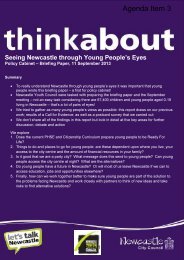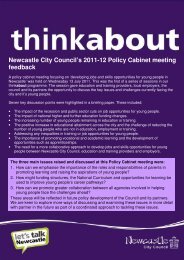NEWCASTLE'S MUSICAL HERITAGE AN INTRODUCTION By ...
NEWCASTLE'S MUSICAL HERITAGE AN INTRODUCTION By ...
NEWCASTLE'S MUSICAL HERITAGE AN INTRODUCTION By ...
You also want an ePaper? Increase the reach of your titles
YUMPU automatically turns print PDFs into web optimized ePapers that Google loves.
may have lacked that vital spark of ambition but one thing is certain and that is<br />
music was his passion. In a letter that appeared in the Newcastle Journal after<br />
his death it was stated that ‘had music been less his passion and more his<br />
business his time would have been more profitably employed’<br />
Avison is often referred to today as the foremost English concerto composer<br />
of his time. It is an epithet that seems to have stuck to him. He composed sixty<br />
concerti grossi in the style of Geminiani as well as arranging another set of<br />
thirteen from Domenico Scarlatti sonatas. His further output comprises a<br />
collection of sonatas for harpsichord and strings in the style of Rameau and odd<br />
anthems and hymns. Further arrangements include a set of 50 Psalms set to<br />
music by Benedetto Marcello, on which he collaborated with John Garth, the<br />
Durham musician. There is also mention of a number of quartets and trios and<br />
one source credits him with as many as 50 violin concertos but this is not<br />
confirmed elsewhere. He was in this respect the most active composer of<br />
concertos amongst the English born musicians of his day. Some fifty or so were<br />
published in his lifetime and these followed Geminiani’s example in the preferred<br />
four-movement scheme and in his use of a concertino group of two violins, viola<br />
and cello as opposed to the two violins and cello of Corelli and Handel. The<br />
twelve for string orchestra are arrangements of Domenico Scarlatti’s harpsichord<br />
sonatas and are reported as being more adventurous than the other concerto<br />
grossi and show a lively feeling for orchestration and a boldness of invention<br />
which is lacking in some of the concertos of the other sets. Following his death,<br />
however, his music remained largely unperformed, but I am pleased to say that<br />
even as I write work is in hand at the Northumbria University to restore some of<br />
his original manuscripts and house these in an Avison Archive in the town’s<br />
Central Library. There is, as well as The Avison Society, a long established early<br />
music group, Concert Royal, that has received a grant from the Regional Arts<br />
Lottery Fund to continue keeping alive the music of Tyneside’s most famous<br />
Georgian musician.<br />
Avison was as much respected for his critical and theoretical writings as for<br />
his musical compositions. It was stated in the last volume of Burney’s History of<br />
Music, 1789, that, ‘musical criticism has been so little cultivated in this country<br />
that its first elements are hardly known’ and then goes on to credit Avison with<br />
being the first and almost the only writer who attempted it. This reference was to<br />
Avison’s famous ‘Essay on Musical Expression’ of 1752 and subsequent<br />
editions. These provoked much discussion and several public replies. The<br />
strength of Avison’s Essay is that it presents the plain good sense of a genuine if<br />
minor composer, but it’s criticisms of other leading composers including Vivaldi,<br />
Palestrina and Handel as being guilty of subordinating harmony to melody or vice<br />
versa, enraged some of his contemporaries and brought a furious reaction from<br />
William Hayes of Oxford University, whose anonymously published pamphlet<br />
attacked Avison the composer as lacking the skill to justify his credentials as a<br />
theorist. Avison replied with dignity to his “virulent, though, I flatter myself, not<br />
formidable, Antagonist” countering his criticisms of specific passages with<br />
12

















